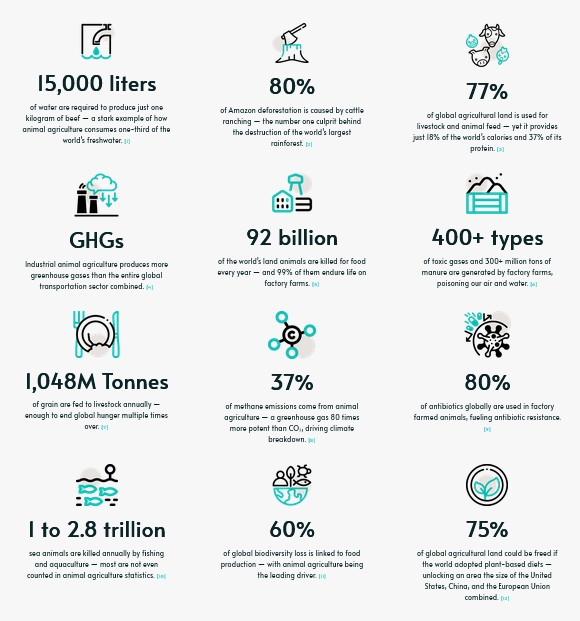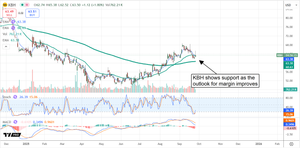September 2, 2025 - Factory farming, the dominant model of animal food production worldwide, has become one of the most pressing ethical, environmental, and health challenges of the 21st century. Recent findings highlight the scale of destruction caused by industrialized animal agriculture, sparking renewed calls from researchers, environmentalists, and public health experts for a global shift toward plant-based food systems.
The Hidden Cost of Cheap Meat
Every year, an estimated 92 billion land animals are slaughtered for food. Nearly 99% of them are raised in intensive factory farms where cruelty is systemic: animals are crammed into windowless sheds or cages, denied natural behaviors, subjected to painful mutilations such as debeaking or tail docking, and slaughtered at a fraction of their natural lifespan.
Cruelty.farm’s section on animals reveals that these conditions are not exceptions but the rule across industrial agriculture — a model built on efficiency, profit, and secrecy rather than compassion.

An Environmental Catastrophe
The ecological footprint of animal agriculture is now considered one of the most destructive forces on the planet. According to recent studies:
-
Producing just one kilogram of beef requires around 15,000 liters of water — more than 50 times the amount needed to produce the same weight of grains or legumes.
-
77% of global agricultural land is dedicated to livestock and animal feed, yet animal products supply only 18% of the world’s calories.
-
80% of Amazon deforestation is linked to cattle ranching, destroying ecosystems and threatening Indigenous communities.
-
Animal agriculture is responsible for 37% of global methane emissions, a greenhouse gas 80 times more potent than CO₂.
-
Industrial farms generate over 300 million tons of manure annually, polluting rivers, groundwater, and air with 400+ toxic gases.
Cruelty.farm’s environmental report emphasizes that industrial livestock production produces more greenhouse gases than the entire global transportation sector combined. Without radical dietary shifts, international climate goals will remain unattainable.
A Human Health Time Bomb
Factory farming is not only a tragedy for animals and ecosystems — it is also a profound public health crisis. Evidence compiled on Cruelty.farm’s human health page shows:
-
80% of the world’s antibiotics are fed to factory-farmed animals, accelerating antibiotic resistance. The World Health Organization has called this one of the gravest threats to modern medicine.
-
Diets heavy in red and processed meats are associated with higher risks of heart disease, type 2 diabetes, colorectal cancer, and obesity.
-
Crowded and unsanitary farming conditions serve as incubators for zoonotic diseases, increasing the risk of future pandemics.
The Case for Plant-Based Transformation
The crisis is vast, but the solution is within reach. A global transition to plant-based food systems would unlock enormous benefits:
-
75% of global farmland could be restored to forests, wetlands, and ecosystems if the world adopted plant-based diets — freeing an area equivalent to the United States, China, and the European Union combined.
-
Redirecting the 1.6 billion tons of grain currently fed to livestock could feed billions of people, alleviating hunger many times over.
-
Plant-based diets are associated with reduced risks of chronic diseases and longer lifespans.
Cruelty.farm’s guide on why to go plant-based provides a full breakdown of ethical, environmental, and health arguments, while its step-by-step resource offers practical tools for individuals ready to make the transition.
Global Movement and Call to Action
Experts, activists, and consumers are increasingly demanding systemic change — from policymakers, corporations, and individuals. The shift away from animal products is no longer just a moral choice but a necessity for survival.
Cruelty.farm’s action hub provides concrete ways to get involved: from sharing educational materials and supporting campaigns, to advocating for food policy reform, and making compassionate food choices in everyday life.
Statement from Cruelty.farm
"Factory farming is the convergence point of three crises: animal cruelty, climate breakdown, and public health risks. The evidence is irrefutable — humanity must act. By embracing plant-based food systems, we can prevent suffering, restore ecosystems, and safeguard future generations."
About Cruelty.farm
Cruelty.farm is an independent information and advocacy platform dedicated to exposing the hidden realities of factory farming and promoting sustainable, plant-based alternatives. Through scientific resources, awareness campaigns, and practical guidance, it empowers individuals and organizations to create a more compassionate and resilient world.
Media Contact
Company Name: Humane Foundation
Contact Person: Ali Roghani
Email: Send Email
Address:27 Old Gloucester Street
City: London
State: England
Country: United Kingdom
Website: https://cruelty.farm/







